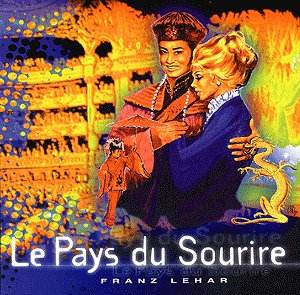This budget release will serve as a good introduction
to anyone sampling Lehár for the first time.
The briefest of notes (about 150 words) are given in
French only. Sadly, no information is provided on which singers sing
which parts, nor the orchestra and its direction.
Lehár, a Hungarian lightweight composer,
introduced a new wave of operetta in the early twentieth century and
he may be justifiably regarded as one of the fathers of ‘The Musical’.
Of Merry Widow fame he launched Le Pays du Sourire in
1929. In 1923, his Yellow Jacket (Die gelbe Jacke) was given
a Chinese setting and told the story of an oriental prince and a Viennese
woman. Despite its spectacular staging the production was only moderately
successful with around one hundred performances. However, Lehár
relaunched this work as Das Land des Lachelns (The Land of Smiles/Le
Pays du Sourire) in a much revised form six years later. The work
then gained immortality. Traubner who has researched the operetta tells
us that the secret of its successful re-launch was principally due to
three items – firstly a much improved libretto, secondly a magnificent
song for Sou-Chong, ‘Yours is my Heart alone’ (tk.9) and thirdly
by giving its principal tenor part to a known star, Richard Tauber.
In fact Tauber, the world-famous Austrian tenor of the 1920s, brought
fame to four of Lehár’s scores during this period (1925-9).
Le Pays du Sourire (The Land of Smiles) is a
straightforward tale of a prince, Sou Chong of China who woos and quickly
weds Lisa, a lady of Vienna. He then takes her home to China at the
end of the first Act. In Act 2 a twist to the previously happy climate
of Act 1 reveals that Lisa has found she has difficulty in adapting
to the ways of the East. Lisa sings her poignant song, ‘How I long
to see my homeland again’ a number skilfully composed to emotionally
stir the audience. A final shock comes when the Prince declares that
he intends to take more wives, and Chinese ones at that. A further twist
lies in the fact that one of the Chinese princesses, Mi longs for some
of the freedom that only the West can offer. She is provided with some
lovely musical moments by Lehár in a both a solo and duet.
The disappointingly short length of this disc means
that only highlights of the music contained in the musical are provided
and so the story mentioned above is perhaps superfluous. However, all
the main numbers are present along with a shortened overture (about
60% has been edited out).
Of the singers, the women are in better voice than
the men. The leading tenor (H. Hayashil) is at times insecure in pitch
and has a pronounced vibrato which does not help delivery of the hit
number Je t’ai donné mon coeur and a harsh resonance sometimes
accompanies another male soloist.
I wonder whether this recording started its life as
a radio broadcast, or as one short LP? This would explain its economic
length and possibly some unusual acoustics. The singers are given artificial
reverberation while the orchestra is closely miked and acoustically
dry. This does not mean to say that the orchestra drowns the singers:
the balance is good and the sound is clear. Fortunately, the covers
the singers’ reverberation and therefore the reverberation is not too
much of a distraction. There is a wider than usual stereo separation
which I find quite attractive.
The leaflet contains details of other discs in the series, some of which
are rarities and may be of particular interest to the reader: there are
two by Francis Lopez – ‘La Perle des Antilles’ (volume 2), and
‘Volga’ (volume 5). Also Lehár’s lesser known ‘Rose de
Nöel’ (volume 3) is listed.


